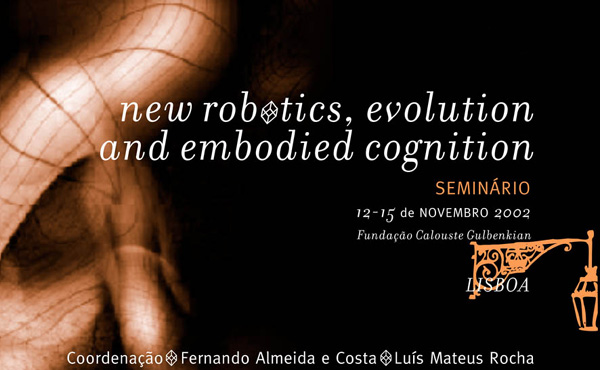

The general purpose is an interdisciplinary discussion centred on "new robotics" envisaging the present state of the art and the foreseeable future of three inter-dependent themes: robotics, biological/evolutionary issues and embodied cognition, in a way that should be profitable both for the participants and attendees. The attendence is by invitation and free of financial charge. Those interested should contact the chairs.
A special issue of the MIT Press journal Artificial Life was edited and published with contributions from the seminar's participants.
IISREEC follows another seminar, The Process of Belief (Lisbon, 15 -18 July 2002), both envisioned and enabled by an interdisciplinary mission directed by Professor Fernando Gil (Universidade Nova de Lisboa; École des Hautes Études en Sciences Sociales, Paris), reporting to the Portuguese Minister of Science and Superior Education.

The seminar will take place in Sala (Room) 1 at the Fundação Calouste Gulbenkian, Av. de Berna, 45A, 1067-001 Lisboa, Telf: (+351)-21-782-3000, Fax: (+351)-21-782-3021. On the first day of the meeting, a reception desk will be available close to Sala (Room) 1.
Invited participants will be staying at the Hotel Zurique, Rua Ivone Silva, 18, 1050-124 Lisboa. Phone: (+351) 21-781-4000. Fax: (+351) 21-793-7290.

9.00-9.30: Talk1: "Designing Sociable Robots" by Cynthia Breazeal, Media Lab, MIT
9.30-10.00: Talk2: "Embodied Artificial Intelligence: On the role of morphology and materials in the emergence of cognition" by Rolf Pfeifer, AI Lab, University of Zurich
10.00-10.30: Talk3: "Machine Psychology: Autonomous Behavior, Perceptual Categorization, and Conditioning in a Brain-Based Device" by Jeffrey Krichmar, The Neurosciences Institute.
10.30 to 10.45: discussants: Phil Husbands and Esther Thelen
15.00-15.30: Talk1: "The body, binding and learning words" by Linda Smith, Department of Psychology, Indiana University, Bloomington
15.30-16.00: Talk2: "Embodiment and Human Reasoning" by Timothy van Gelder, Department of Philosophy, University of Melbourne
16.00 to 16.15: discussants: Fernando Gil and Andy Clark
9.00-9.30: Talk1: "Evolutionary Robotics: A new scientific tool for studying cognition" by Inman Harvey, COGS (School of Cognitive and Computing Sciences), University of Sussex
9.30-10.00: Talk2: "Evolutionary Spiking Circuits for Vision-Based Robots" by Dario Floreano, Autonomous Systems Laboratory Institute of Systems Engineering, Swiss Federal Institute of Technology, Lausanne
10.00-10.30: Talk3: "Friends Reunited? Representation, Computation, and Dynamical Systems, after Evolutionary Robotics" by Michael Wheeler, Department of Philosophy, University of Dundee
10.30 to 10.45: discussants: Cynthia Breazeal and Fernando Almeida e Costa
15.00-15.30: Talk1: "The Emergence of Symbols and Representations" by Luís Mateus Rocha, Los Alamos National Laboratory.
15.30-16.00: Talk2: "Strange loops in learning and evolution" by Janet Wiles, University of Queensland
16.00 to 16.15: discussants: Agostinho Rosa and Randall D. Beer
Beyond Robotics - the new European research initiative by Pekka Karp, FET, Future and emergent technologies, European Commission.
9.30-10.00: Talk1: "Evolution and Analysis of Minimally Cognitive Model Agents" by Randall D. Beer, Computer Science and Biology Departments, Case-Western Reserve University
10.00-10.30: Talk2: "Using Dynamic Field Models to Conceptualize the Interface of Perception, Cognition, and Action" by Esther Thelen, Psychology Department, Indiana University, Bloomington
10.30 to 10.45: discussants: Timothy van Gelder and Mark Bedau
9.00-9.30: Talk1: "How evolution of development tinkered the emergence of complex behaviours in the immune system" by António Coutinho, Instituto Gulbenkian de Ciencia.
9.30-10.00: Talk2: "The creativity of evolution" by Mark Bedau, Reed College, Portland State University.
10.00-10.30: Talk3: "Putting the Flesh on Embodied Cognition: Singing Burrows and Surrogate Situations" by Andy Clark:. Cognitive Science Program, Indiana University, Bloomington.
10.30 to 10.45: discussants: Luís Mateus Rocha and Jeffrey Krichmar
15.00 - 15.15: Special presentation on applied embodied robotics by Takashi Gomi
15.15-15.45: Talk1: "From neuroscience to robotics" by Phil Husbands, COGS (School of Cognitive and Computing Sciences), University of Sussex.
15.45-16.15: Talk2: "New robotics: critical issues and the foreseeable future" by Rodney Brooks, AI Lab, MIT.
16.15 to 16.30: discussants: Rolf Pfeifer and Inman Harvey

João Lobo Antunes. Department of Neurosurgery. University of Lisbon
Mark Bedau, Reed College and Portland State University.
Randall D. Beer, Computer Science and Biology Departments, Case-Western Reserve University
Cynthia Breazeal, Media Lab, MIT
Rodney Brooks, AI Lab, MIT.
João Caraça, Serviço de Ciência da Fundação Calouste Gulbenkian
Andy Clark, Cognitive Science Program, Indiana University, Bloomington.
Helder Coelho, Faculdade de Ciencias, Universidade de Lisboa
Ernesto Costa, Departamento de Engenharia Informática, Universidade de Coimbra
Fernando Almeida e Costa, University of Sussex
António Coutinho, Instituto Gulbenkian de Ciencia.
José Luís Ferreira, Universidade Autónoma de Lisboa.
Dario Floreano, Autonomous Systems Laboratory Institute of Systems Engineering, Swiss Federal Institute of Technology, Lausanne
Fernando Gil, Universidade Nova de Lisboa; École des hautes Études en Sciences Sociales, Paris
Inman Harvey, COGS (School of Cognitive and Computing Sciences), University of Sussex
Phil Husbands, COGS (School of Cognitive and Computing Sciences), University of Sussex.
Pekka Karp, FET, Future and emergent technologies, European Commission.
Jeffrey Krichmar, The Neurosciences Institute.
Luís Moniz Pereira. Department of Computer Science, Universidade Nova de Lisboa
Rolf Pfeifer, AI Lab, University of Zurich
Luís Mateus Rocha, Computer and Computational Science Division, Los Alamos National Laboratory
Agostinho Rosa, LaSEEB - Laboratório de sistemas evolutivos e engenharia biomédica, ISR/IST
Luís Seabra Lopes, Universidade de Aveiro
João Sentieiro, Instituto de Sistemas e Robótica, Instituto Superior Técnico.
Linda Smith, Department of Psychology, Indiana University, Bloomington
Esther Thelen, Psychology Department, Indiana University, Bloomington
Timothy van Gelder, Department of Philosophy, University of Melbourne
Michael Wheeler, Department of Philosophy, University of Dundee
Janet Wiles, University of Queensland


